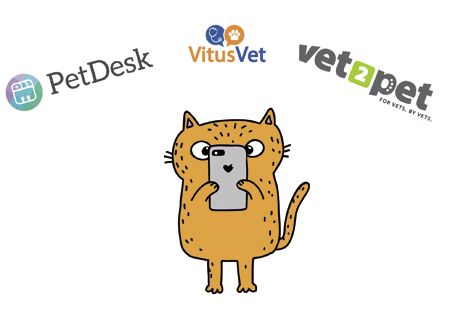(App)licable: How mobile apps can grow your practice and improve client experience
Is your clinic (app)rehensive? Three veterinary app developers use data to explain why mobile apps are good for business.

Shutterstock.comCVC educator Bash Halow, LVT, CVPM, sat down with veterinary app developers Stacee Santi, DVM, of Vet2Pet; Mark Olcott, DVM, of VitusVet; and Sam Schopler of PetDesk for a virtual roundtable on the value of veterinary apps.
Client (app)eal
Halow: Each of you has reliable, straightforward data on your veterinary app's ability to effectively connect clinics with clients. Want to share?
Dr. Santi: I'll start. We partnered with Colorado State University professor Lori Kogan, PhD, to anonymously interview 610 pet owners. More than half preferred an app to a phone for making appointments, checking clinic hours, looking for veterinary information and accessing medical information. Imagine a world where calls for those services are reduced by half or more? How much more time does that give your customer service representatives to genuinely connect with clients?
Dr. Olcott: Each company represented here succeeds at getting at least 30 percent of any practice's clients to download their respective app, which is much higher than websites or other older communication tools of the past. Each of us tracks our users' behaviors (when they use the app, what they use it for and so forth). We see a net increase in appointments and refills that is demonstrably not from cannibalizing one channel in favor of another.
Schopler: And communications sent through apps are four times more likely to be read by clients than communications sent by email. That means that roughly 90 percent of veterinary clients read the communications sent to them through apps. This isn't anecdotal-it's data that's been gathered through the apps themselves.
Money-making (app)aratus
Schopler: Our app helps practices coordinate all communication on one dashboard. Apps can eliminate the need to confirm appointments and can remind clients to follow through with recommendations.
Dr. Santi: Practices that add a client loyalty program to the app see an increase of $10 per average client transaction and one more visit per client after that client earns whatever reward is offered in the program. The potential is there to earn tens of thousands in additional revenue and to build better client relationships.
Dr. Olcott: Veterinarians often don't realize this, but our profession is still highly dependent on the phone at a time when consumers don't really want to talk on the phone. Apps effectively automate refills, the scheduling of appointments and the many kinds of client communication we need to provide. That automation frees up your customer service representatives to do the things they joined your practice to do in the first place: directly interact with clients and pets. So let's get their eyes off the computer screen and their ears off the phone and focus both where they're likely to make the most impact: on our clients.
(App)ropriate communications
Dr. Santi: Imagine a world where you could reach out to all clients who own a Labrador with a specific message about the dangers of obesity or to all Maltese owners with a reminder that the discounts you offer during National Dental Health Month are perfect for their dogs. Apps provide a more customized way to talk to your clients that deepens your relationship with them.
Dr. Olcott: They can also provide instant access to a pet's medical records. That transparency improves the clients' loyalty and trust in the practice.
Schopler: Smart devices are in everyone's hands these days, and you now have a chance to put a message on that device's screen-one that will be read and most likely acted on. That message can be a helpful reminder or a link that allows clients a fast, easy way to follow through with a recommendation.
Dr. Olcott: According to one study, more than 60 percent of pet owners think of their pets as family members. Apps can be a place where that family member's information is organized, personalized and kept on hand.
Dr. Santi: Once they download the app, one out of every three pet owners continues to interact with it and use it. That's a regular reminder of you, your team, your services and how much you care.
Dr. Olcott: Mobile presence is the next piece of “real estate” that practices need. Ten years ago it was a website. Five years ago it was a Facebook page. But now I ask, “What's your mobile strategy? How are you going to leverage this powerful channel to engage clients, improve patient care and make the door swing?”